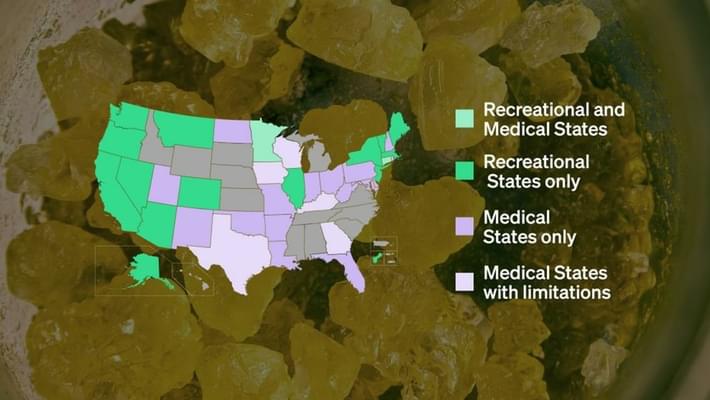
In Which States is Cannabis Concentrates Legal?
Published on 9/30/21
To say that cannabis concentrates have exploded in popularity over the last few years is a clear understatement. Not only have the sales of cannabis concentrates increased by more than 40 percent last year, but they also accounted for the largest share of the overall legal cannabis market in terms of growth.
According to the Colorado Marijuana Enforcement Division's (MED) 2019 annual report, 40,229 pounds of concentrate products were sold across both the medical and adult-use markets that year, up nearly 128 percent from 2016 when 17,647 pounds of concentrate products were sold. In comparison, in 2019, 350,429 pounds of flower products were sold across both the adult-use and medical markets, compared to 335,640 pounds of flower in 2016, an increase of only 4.4 percent.
In June 2019, Massachusetts cannabis consumers purchased $12.9 million of concentrates. An analysis of June 2020, just a year later, showed consumers snapped up $14.1 million worth of concentrate products, an increase of 38 percent and 17 percent, respectively.
Cannabis concentrates have been a hit with America's neighbors to the North, Canada, as well. Since extracts were legally allowed to be sold in Canada starting in October 2019, consumers have been crazy about the stuff. That month, 320,201 units of concentrate products were sold on the non-medical market. In April 2020, the most recently reported month, 813,972 units were sold in the adult-use market, an increase of 154 percent.
Despite the popularity of concentrates and legal cannabis overall, however, there are still places where recreational consumers and medical patients alike can't get the cannabis concentrates they're looking for. This article is going to break down exactly where and what states consumers can legally get their hands on some top-notch cannabis concentrates.
What are Concentrates?
Before we break down which states and U.S. territories you can legally get cannabis concentrates, it's important to define what exactly they are. While we've covered this topic in-depth before here on Leafwell, it's worth revisiting here briefly before breaking down which states you can and can't get some legally.
As a general rule, think of cannabis concentrates as cannabis broken down to its simplest possible form. Usually made from the standard cannabis flower you can purchase at your local dispensary, concentrates come in the form of waxes, infused oils, shatters, or resin products that are, on average, between 50 to 90 percent THC levels, while the traditional flower usually comes in around 10 to 35 percent.
Concentrates tend to be simpler and stronger versions of the cannabis flower you can buy at your local dispensary in a simple and accessible vape, cream, edibles, or smokeable wax, shatter, and crumble.
 Leafwell
LeafwellWhere are Cannabis Concentrates Legal?
You may think that if a state has legalized either recreationally or medically, the residents of that state would have access to any and all cannabis products they were looking for. Unfortunately, without full federal legalization, that simply won't be the case.
Each state has different rules when it comes to what products you can get, whether you can grow your own cannabis, how much you can possess at once, and a few other important points. It's important to do your research on your particular state's rules and regulations.
